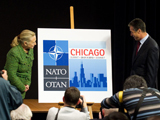NATO after Chicago – Cruising or Stumbling Along?
23 Jul 2012
Today we begin our week-long coverage of the recent NATO Summit in Chicago. More particularly, we provide a critical overview of the summit’s objectives and outcomes, and then perform yet another health check on the Alliance.
Although NATO officials predictably declared the Chicago Summit a success, the reaction by some critics was predictably dour. (In all fairness, couldn’t an exasperated wag claim at this point that NATO has been undergoing the longest institutional death in modern history?) In our first featured video, Stephan Flanagan of the Center for Strategic and International Studies (CSIS) reviews the three main objectives of the summit – i.e., 1) to reaffirm the Alliance’s financial and post-drawdown military commitments to Afghanistan, 2) to promote Smart Defence, which in practical terms means the pooling and sharing of resources to “get more defense for less money,” and 3) to continue working with NATO’s 50+ partner nations worldwide on common security concerns. (Flanagan particularly emphasizes that contrary to expectations, the cash-strapped European members of the Alliance did not announce further spending cuts in Afghanistan.)
Courtesy of external pageCSIScall_made/external page7Revolutionscall_made
In our second video, STRATFOR analyst Nate Hughes disagrees with NATO Secretary General Anders Fogh Rasmussen’s insistence that the Chicago meeting was a success. Indeed, “very little” emerged from this “very ordinary” event, which confirms in Hughes’ eyes that history has passed the Alliance by – i.e., that it has lost its underlying and historically-based purpose. Absent a substantive common threat, the diverging interests of the 28 member-states will only continue to fray and lead to paralysis. Nevertheless, Hughes concludes that NATO still plays an important – if declining – role in the world today, mainly as a platform to forge security alliances with a variety of states and organizations.
Courtesy of external pageSTRATFORcall_made
Finally, in contrast to Hughes’ qualified and therefore faint praise, Flanagan concludes today’s discussion by arguing that the Alliance remains as relevant as ever. In other words, new security challenges, whether in the form of terrorism, civil wars and insurgencies, or other threats, actually justify its existence rather than call it into question. While shrinking budgets will inevitably impose constraints on the member states, Flanagan finds it significant that while in Chicago none of them ruled out future interventions by the Alliance on the scale recently seen in Libya or even Afghanistan.
Courtesy of external pageCSIScall_made/external page7Revolutionscall_made

